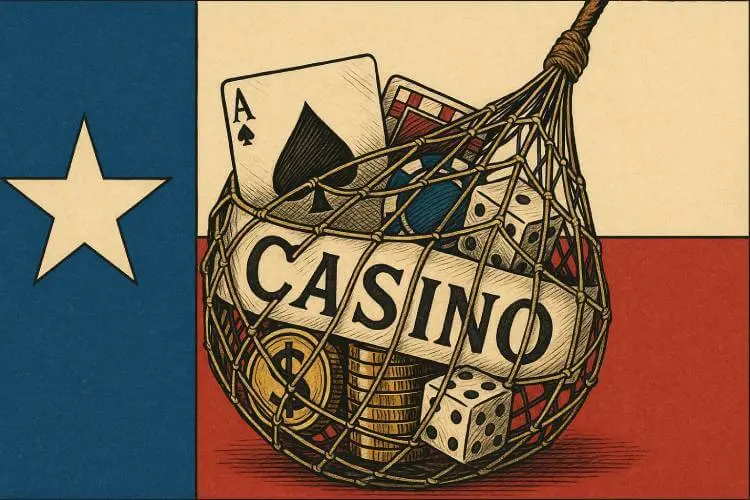Texas Tightens the Net: Sweepstakes Casinos Face a Legal Reckoning


California’s recent decision to outlaw sweepstakes casinos has rattled the online gaming landscape, and the next big test may be coming from Texas. For years, sweepstakes casinos have operated in a murky legal zone across the Lone Star State, offering casino-style games without technically breaking gambling laws. Now, with newly expanded legislation and strong anti-gambling sentiment in Austin, that delicate balance could soon collapse.
A Legal Model Built on Loopholes
Sweepstakes casinos are not traditional gambling platforms. They don’t directly allow real-money wagers or payouts, which keeps them outside the state’s legal definition of gambling, at least for now. Players purchase or receive “Gold Coins” to play for entertainment, while “Sweeps Coins” can be used to win cash prizes. Because Sweeps Coins can also be obtained for free through mail-in entries or promotions, the model avoids one of the key elements that defines gambling in Texas law: consideration, or payment for a chance to win.
This structure has allowed sites like Chumba, LuckyLand, and Global Poker to operate freely in Texas, drawing thousands of users. The games mimic slots, blackjack, and poker, complete with bright visuals, jackpots, and social features, yet exist under the umbrella of sweepstakes promotions.
However, the distinction between “free-to-play” and “real-money” gaming has grown thinner each year. As the popularity of these casinos has exploded nationwide, state lawmakers and attorneys general have become increasingly skeptical of the model.
The SB 517 Turning Point
Earlier this year, Texas quietly passed Senate Bill 517, a measure that broadens the definition of what counts as a “gambling device” and a “thing of value.” Though not explicitly targeting sweepstakes casinos, the bill’s wording could easily encompass virtual currency systems used by these sites.
Legal analysts believe that this new language gives the Texas Attorney General and local prosecutors more tools to challenge the legality of sweepstakes casinos. By treating virtual tokens as a “thing of value,” regulators could argue that the purchase of Gold Coins, even when paired with “free” Sweeps Coins, meets the threshold for illegal gambling.
At the same time, SB 517 underscores the legislature’s reluctance to expand gambling in any form. While some states have moved toward regulation or taxation, Texas appears to be tightening definitions to close potential loopholes.
Political Climate: Firm Resistance
Texas has long been one of the most gambling-averse states in the country. Beyond the state lottery, horse racing, and limited charitable gaming, most forms of wagering remain illegal. Efforts to legalize sports betting and casinos have repeatedly failed, mainly due to opposition from influential state leaders.
Lieutenant Governor Dan Patrick remains a staunch opponent of gambling expansion and has used his position in the Senate to block any bills that would loosen restrictions. Meanwhile, every major candidate running for Attorney General in 2026, including Aaron Reitz, Joan Huffman, Chip Roy, and Mayes Middleton, has publicly supported enforcing existing laws rather than creating new gaming frameworks.
That united stance leaves sweepstakes casinos on increasingly shaky ground. Without legislative allies or public backing, the industry may soon face the same political and regulatory headwinds that swept through California.
The Role of the Attorney General
While Texas lawmakers won’t reconvene until the 2027 session, the Attorney General’s office has the power to change the landscape far sooner. A formal AG opinion could reinterpret the state’s gambling statutes to classify sweepstakes casinos as illegal, without passing a new law.
Such opinions are advisory rather than binding, but they carry significant weight.
State agencies, payment processors, and app stores typically act on them, effectively cutting off operators from Texas players. Earlier this year, California’s Attorney General issued a similar opinion on daily fantasy sports before the legislature acted, creating an enforcement chill long before AB 831 was signed.
If Texas Attorney General Ken Paxton or his successor issues a comparable opinion, sweepstakes operators would likely geoblock Texas users or suspend cash redemptions overnight.
Economic and Player Impact
The potential fallout would be considerable. Texas represents one of the largest markets for social and sweepstakes gaming in the United States. Removing access could cost operators millions in lost revenue and marketing reach.
For players, the effects would be immediate: limited access to platforms, delayed withdrawals, and possible forfeiture of in-progress balances if a site pulls out abruptly. Some users may turn to offshore real-money casinos, which lack consumer protections and are often unregulated.
Industry observers warn that restricting sweepstakes casinos could unintentionally push players toward riskier platforms, replicating what has already occurred in other prohibitionist states.
A Familiar Pattern Emerging
California’s recent ban set a precedent by redefining sweepstakes games as unlicensed casinos. Montana, Connecticut, and New Jersey have since passed similar measures, while New York’s prohibition is awaiting the governor’s signature.
Texas could follow this trend through a different route, not with new lawmaking, but through administrative interpretation and legal enforcement. The state’s existing anti-gambling framework already provides ample authority to challenge the dual-currency model at the heart of sweepstakes operations.
Outlook: Caution on All Sides
For now, sweepstakes casinos continue to function in Texas under the same structure that has kept them technically legal for years. But the combination of SB 517’s expanded definitions, the state’s conservative political climate, and mounting national pressure makes a crackdown increasingly likely.
Operators are watching closely, adjusting compliance practices, and exploring geolocation filters to prepare for potential restrictions. Players, meanwhile, should stay alert; what’s legal today in Texas may not be tomorrow.
If the Attorney General decides to act, Texas could become the next major front in the nationwide fight over sweepstakes casinos, and another sign that the free-to-play era of online gambling is running out of room to operate.
You Might Also Like:
Was this article helpful?
